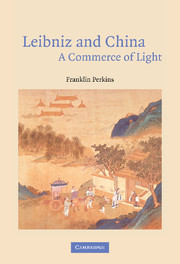5 - Leibniz and cultural exchange
Published online by Cambridge University Press: 16 November 2009
Summary
At the time Leibniz wrote his most complex work on Chinese philosophy, the decision against the Jesuits and accommodation was already made. In 1704 Pope Clement XI decided against the Jesuits; his decree was published in China in 1707 and in Europe in 1709. Leibniz did not know it, but this decision was to remain the Church's position until the twentieth century. Kangxi was offended and issued a decree requiring missionaries to accept the position of accommodation if they wished to remain in China. The Jesuits evaded either the pope or the emperor for as long as they could, but, as the pope's decision stood firm, more and more missionaries were forced to leave. In 1724, Kangxi's son, Yongzheng, banished all missionaries except those necessary for astronomy. A long period of distance between Europe and China followed, lasting until hostilities broke out in the nineteenth century; hostility and forced concessions continued into this century. As the historical opportunity for exchange with China was lost, the philosophical landscape also shifted. The eclectic but avid Renaissance interest in other cultures had given way to gradual indifference among seventeenth-century philosophers, with the exception of Leibniz. Even so, it remained a time in which Leibniz could call for missionaries from China without creating too much commotion. Although Leibniz, Descartes, Locke, and Spinoza remain Euro-centric, all four make claims for the equal abilities of peoples from all cultures.
- Type
- Chapter
- Information
- Leibniz and ChinaA Commerce of Light, pp. 199 - 208Publisher: Cambridge University PressPrint publication year: 2004



